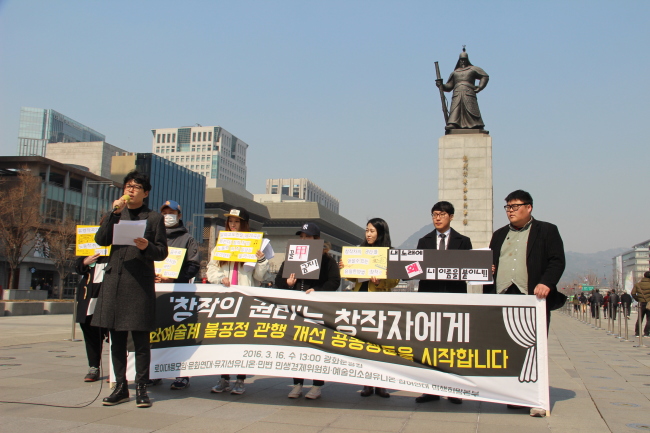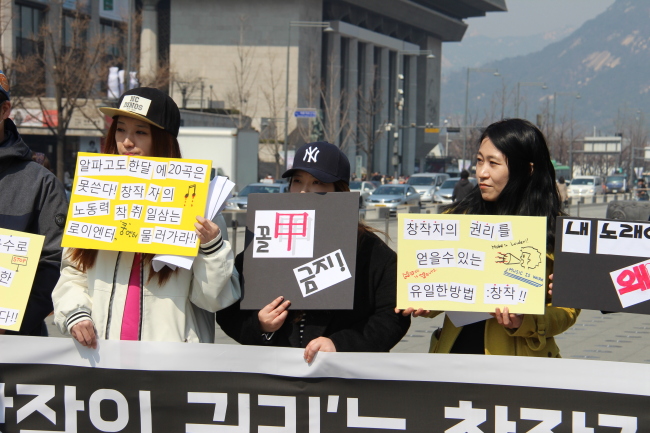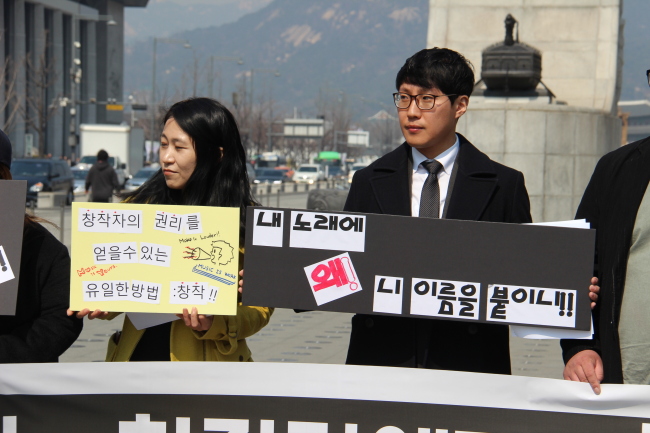Public backlash continues against big-time media entertainment and production companies in Korea after a number of local indie artists recently went public about their working conditions.
The controversy first ignited when some of the artists who helped make the soundtrack to the popular TV drama “Cheese in the Trap” took to social media to vent their anger at not being paid for their work.
The outrage has spiraled throughout the local artist community, prompting the Artists Social Union -- a labor union of Korean artists working to improve labor conditions -- to hold a public protest against unjust and often nonexistent contracts.
 |
Members of the Artists Social Union hold a protest against unjust working conditions for local artists at Gwanghwamun Square in Seoul on Wednesday. (Julie Jackson/The Korea Herald) |
According to a survey released by the Artists Social Union in March 2015, only 30.7 percent of 5,000 local artists surveyed claimed to have been given a written contract when holding a performance of any kind. However, of the 30.7 percent, 12.2 percent claimed the terms of their contract were unjust and unreasonable.
Fueled by the recent controversy over the mistreatment of indie artists, members of the Artists Social Union held a protest at the Gwanghwamun Square in Central Seoul on Wednesday.
“It’s my song, why are you taking credit for it?” one protester’s sign read.
“Local artists continue to be victims of unjust contracts and unfair working conditions,” said singer-songwriter Sohn A-ram during the protest.
“To be more specific, the practices of the drama music production company ROE Entertainment are particularly egregious and must be stopped,” he added. “We will be taking legal action, and this is only the beginning.”
 |
Members of the Artists Social Union hold a protest against unjust working conditions for local artists at Gwanghwamun Square in Seoul on Wednesday. (Julie Jackson/The Korea Herald) |
“I was a former writer for ROE Entertainment and I have witnessed the management’s unjust treatment of their employees and artists,” said Kim Ein-young, who said she made just 300,000 won ($250) a month.
“I was told by my boss at ROE Entertainment that if I was unhappy with my pay and working conditions, I should just leave. They told me they refuse to change their policies and that they would just find another writer willing to work under those conditions.”
In a press statement released Monday, Artists Social Union announced its plan to take legal action against ROE, the broadcast music production company behind the soundtracks of hit TV drama series “Reply 1994” and “Reply 1997,” as well as albums for “Three Meals a Day” and “The Producers.”
“The true face of ROE Entertainment is one that coerces artists into signing unjust contracts, one that violates copyright and one that habitually delays wage payments to engineers,” read the Artists Social Union statement.
“This issue goes beyond ROE Entertainment. It is an issue that affects the entire art world with its unfair practices,” it added.
 |
Album jacket cover of “Cheese in the Trap” OST. (CJ E&M) |
ROE is not the only entertainment agency under fire. The recent labor issues first gained attention following CJ E&M’s release of the original sound track to “Cheese in the Trap,” which the entertainment giant had said would highlight the work of local indie artists rather than feature tracks by idol stars and ballad singers.
Although the gesture may have seemed like a generous leg up for relatively under-the-radar acts, it was revealed after the album’s release that many of the artists were poorly compensated financially for their work and were strong-armed into signing unreasonable contracts after being told by CJ E&M officials that the low monetary compensation was a standard practice.
“When artists lend their music to appear on a TV show, it is standard practice that they either receive up-front licensing fees or back-end royalty fees,” a music industry insider who works closely with local indie artists told The Korea Herald by phone. “However, this was not the case with the ‘Cheese in the Trap’ soundtrack.”
“CJ E&M asked for everything and gave nothing in return. It’s abusing its market-dominant position and forcing indie artists to accept crap deals knowing they have no ability to change these conditions,” he continued. “Local indie artists have been comparing notes with everyone and finding out that what they are doing is not a local standard, and definitely not a global standard. But CJ E&M is so powerful, people are afraid to talk back.”
As if the lack of payment wasn’t enough to anger local indie musicians, it was later revealed that CJ E&M’s TV department had a record-breaking fiscal year, announcing the company’s first-ever stockholder dividends. Although officials at CJ E&M refused to confirm the rumors, many CJ employees publicly stated that they expected a “huge bonus” this year.
 |
Members of the Artists Social Union hold a protest against unjust working conditions for local artists at Gwanghwamun Square in Seoul on Wednesday. (Julie Jackson/The Korea Herald) |
Following the conclusion of “Cheese in the Trap,” CJ E&M announced that they were sending the cast members of the show on an all-expenses-paid, five-day trip to Phuket, Thailand, as a congratulatory bonus for the success of the show.
“Publicizing that was just throwing more salt on the wound,” the industry insider added.
Indie artist Go Chang-in of Sugarbowl last month tweeted that the “Cheese in the Trap” crew did not even pay him a session fee for mixing and mastering tracks, nor was he paid for the songs used for the OST.
Lee Yoon-jung, music director for the soundtrack, retweeted Go, replying, “Because I was told that I could not produce the tracks myself, I had to look for noncommercial songs by indie bands. And although I asked that terms and conditions be favorable to benefit the bands, there was not much I could really do beyond that.”
Last Friday, CJ E&M told a local news outlet they were shocked by the indie bands’ outrage.
“Unlike our original OST concepts, we decided this time around that we would use indie music for the ‘Cheese in the Trap’ soundtrack,” a CJ E&M official was quoted as saying. “The terms and conditions were formed with the good intention to split the profits evenly among the OST production team and the indie artists under our label.”
“The ‘Cheese in the Trap’ soundtrack went on to top music charts and received a lot of positive attention. So we were surprised that a controversy like this has erupted,” the official added.
But many argued that CJ’s profit sharing was less generous than it made out.
“CJ E&M said that it split profits evenly among its production team and the indie artists, but that was after they took off 20 percent, and then split it 50/50,” said the industry insider. “That is in no way a local or a global standard practice.”
By Julie Jackson (
juliejackson@heraldcorp.com)











